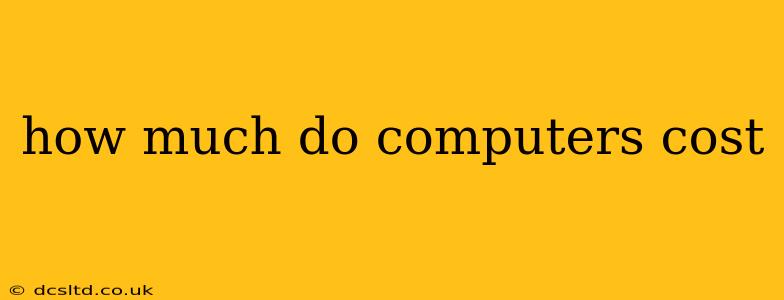How Much Do Computers Cost? A Comprehensive Guide
The cost of a computer can vary wildly, depending on your needs and desired specifications. There's no single answer to "how much do computers cost?" Instead, the price depends on several factors, which we'll explore in detail. Understanding these factors will help you determine a realistic budget and find the perfect computer for your needs.
What kind of computer are you looking for?
This is the most crucial question. Are you looking for a desktop, laptop, tablet, or something else entirely? Each type comes with its own price range.
-
Desktop Computers: Generally, desktops offer the best performance for your money, especially if you're looking for high processing power or extensive storage. You can find budget-friendly desktops starting around $300, while high-end gaming or professional workstations can cost several thousand dollars.
-
Laptops: Laptops prioritize portability over raw power, leading to a higher price point for similar specifications compared to desktops. Basic laptops can start around $250, but powerful gaming laptops or ultra-thin, high-performance models can easily exceed $2000.
-
Tablets: These are typically the most affordable option, suitable for basic tasks like browsing the internet, checking email, and consuming media. Entry-level tablets can cost less than $200, while higher-end models with advanced features might cost $500 or more.
What are the key components affecting the price?
The cost of a computer is directly influenced by the quality and specifications of its components. Let's break down the major factors:
-
Processor (CPU): The brain of the computer. More powerful CPUs, like those from Intel's Core i7 or AMD's Ryzen 7 series, will significantly increase the price. Entry-level CPUs are much cheaper.
-
Memory (RAM): This determines how much information your computer can access quickly. More RAM means smoother multitasking, but it also increases the cost. 8GB is a common minimum for modern usage, while 16GB or 32GB are preferred for demanding tasks.
-
Storage (Hard Drive or SSD): This is where your files are stored. Solid State Drives (SSDs) are faster and more expensive than traditional Hard Disk Drives (HDDs). The amount of storage space also plays a role; larger drives cost more.
-
Graphics Card (GPU): Crucial for gaming and graphics-intensive tasks. Dedicated GPUs significantly boost performance but add substantially to the overall price. Integrated graphics (built into the CPU) are less expensive but less powerful.
-
Operating System: Windows, macOS, and Chrome OS are popular operating systems. The cost of the OS is usually included in the overall price of the computer, but upgrading to a professional version might cost extra.
-
Display (for laptops and tablets): Screen size, resolution (e.g., 1080p, 4K), and technology (e.g., IPS, OLED) all influence the price. Higher resolution and better technology generally cost more.
What are the different price ranges for computers?
Based on the components and type of computer, you can find options within various price brackets:
-
Budget-Friendly (<$500): Expect basic specifications, possibly with slower processors, less RAM, and smaller storage. These are suitable for basic tasks like web browsing and email.
-
Mid-Range ($500-$1000): Offers a good balance of performance and price. You'll find more powerful processors, more RAM, and possibly an SSD. Suitable for everyday tasks, light gaming, and some creative work.
-
High-End ($1000+): These computers pack the latest and greatest components, offering top-tier performance. Expect powerful processors, ample RAM, fast SSDs, and potentially dedicated high-end GPUs. Ideal for gaming, video editing, and other demanding applications.
Where can I find the best deals on computers?
Shopping around is key. Check major retailers like Best Buy, Amazon, and Newegg, as well as directly from manufacturers like Dell, HP, and Lenovo. Sales and promotions are frequent, so be patient and watch for deals. Consider refurbished computers for significant savings, but carefully check the warranty and condition.
By considering these factors, you can make an informed decision and find a computer that perfectly fits your needs and budget. Remember to research specific models and compare specifications before making a purchase.
